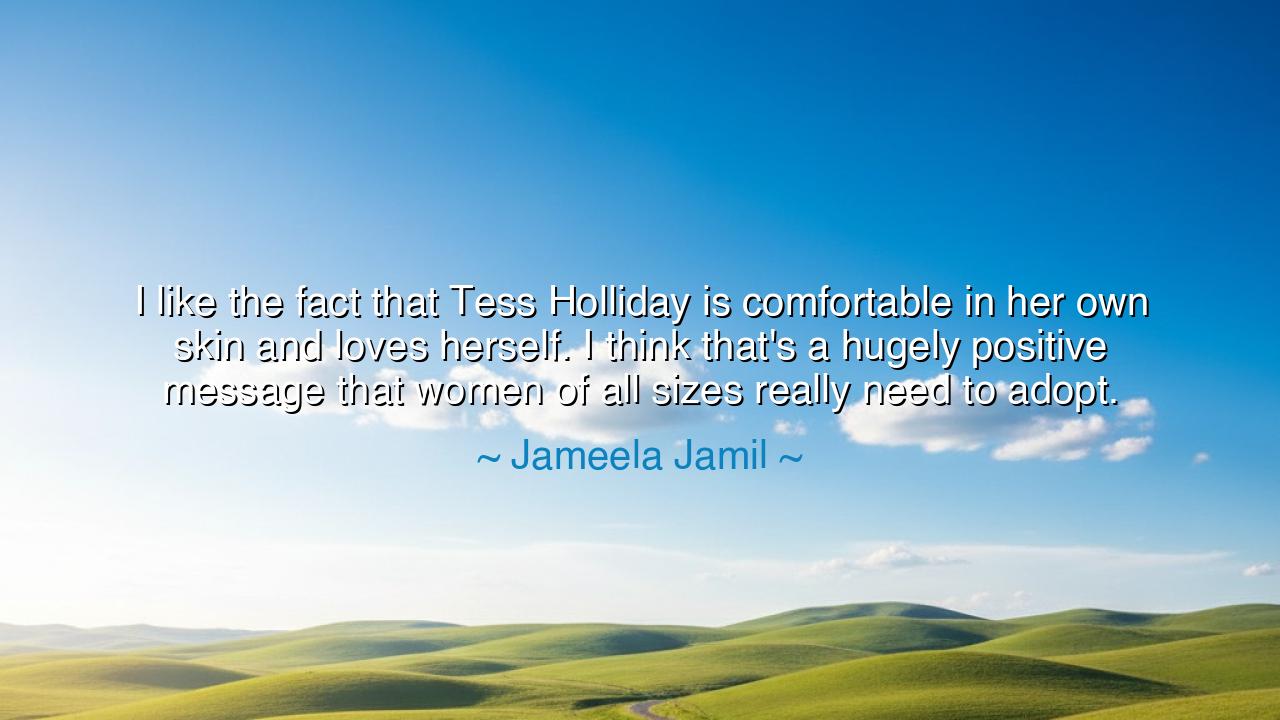
I like the fact that Tess Holliday is comfortable in her own
I like the fact that Tess Holliday is comfortable in her own skin and loves herself. I think that's a hugely positive message that women of all sizes really need to adopt.






The words of Jameela Jamil—“I like the fact that Tess Holliday is comfortable in her own skin and loves herself. I think that's a hugely positive message that women of all sizes really need to adopt.”—resound like a call from the mountains to the valleys. They remind us that the highest form of strength is not always found in conquest or fame, but in the quiet, unshakable embrace of one’s own self. To be comfortable in one’s own skin is to walk unclothed of fear, free from the chains of shame that society has forged, and to declare with unyielding voice: I am enough.
The origin of this message lies in the struggle of countless generations. For ages, men and women alike have been burdened by ideals crafted not by truth, but by the fleeting fashions of their time. Tess Holliday, standing firm in her self-love, defied those voices that would diminish her. And Jameela Jamil, seeing this defiance, proclaimed it as a beacon—a positive message—that women of every shape and form might rise and claim dignity. This is not vanity, nor is it pride. It is the most sacred form of survival: the refusal to be erased.
The ancients knew well that to despise oneself was to invite ruin. Recall the tale of Socrates, who urged his disciples to “know thyself.” But knowing is not enough if it is unaccompanied by acceptance. Many have known their form, their flaws, their failings—but in loathing themselves, they stumbled into despair. Contrast this with the warrior Achilles, who, though doomed by fate, bore himself with full knowledge of his destiny. He strode into battle not in denial of who he was, but in fierce acceptance of it. That acceptance made him immortal in song.
In more recent times, let us remember Rosa Parks. She was a woman who refused to move from her seat, not because her body was mighty or adorned according to society’s standards, but because her self-worth was unshakable. The world tried to tell her she was less; she knew she was equal. This act of courage, born of self-love and dignity, moved mountains and reshaped history. Thus, self-acceptance is not merely a private comfort—it is the seed of revolution.
The lesson here is radiant: when a woman—or a man—chooses to love themselves as they are, they not only liberate their own spirit, but they unlock a path for others to walk. For each person who stands proudly in their own skin, a thousand witnesses are inspired to loosen their chains. Love of the self is not selfishness; it is service to the world, for it challenges cruelty and plants the banner of freedom in the heart.
And so, to the listeners of this teaching, I say: look into the mirror and greet yourself not with scorn but with reverence. Speak kindly to your reflection, as you would to a beloved friend. Surround yourself with voices that affirm rather than diminish you, and when the cold whispers of judgment arise, remember Tess Holliday, remember Jameela Jamil, and remember all who bore the mantle of self-acceptance before you.
The path is not easy, for the world profits from your doubt. But carry this truth: beauty has no single shape, dignity has no narrow measure, and worth cannot be weighed on scales. Every scar, every curve, every imperfection is part of the tapestry that makes you whole. To reject it is to reject your story. To embrace it is to stand as a hero in the saga of your life.
Therefore, let us take up this wisdom as a torch: love yourself with boldness, guard your self-worth as a treasure, and in doing so, you shall not only find peace—you shall give strength to others still searching for their light.






NTdinh nam truòng
I agree with Jameela Jamil’s sentiment about Tess Holliday. Self-love and being comfortable in one’s skin are messages that resonate with so many people who struggle with body image. However, how do we make this a more universal concept, not just a trend or a message for certain individuals? What can we do to ensure that people of all body types, ethnicities, and backgrounds feel empowered to love themselves the way they are?
DAnguyen ba duc anh
It’s refreshing to hear Jameela Jamil acknowledge Tess Holliday’s confidence and self-love. The idea that women of all sizes should adopt this mindset is crucial, as it challenges the traditional beauty standards that often leave many feeling inadequate. But what about the pressures society places on women? How can we create spaces where women are truly free to love themselves without the fear of judgment or exclusion based on size or appearance?
KVLuong Khanh Viet
Jameela Jamil's words about Tess Holliday are really impactful. It’s so important to promote body positivity, and Tess is a great example of someone who shows that confidence isn’t limited to a certain body type. But how do we shift societal norms so that women of all sizes feel truly comfortable in their own skin? What steps can we take to create a more inclusive environment where self-love is celebrated for everyone?
UGUser Google
I really appreciate Jameela Jamil's perspective on Tess Holliday. Embracing self-love and being comfortable in one’s own skin is such an empowering message, especially in a world that often tells women to conform to certain standards. But why is it that self-love and body acceptance are still revolutionary concepts? How can we encourage more people, regardless of their size, to embrace their own uniqueness without feeling judged or pressured by society?